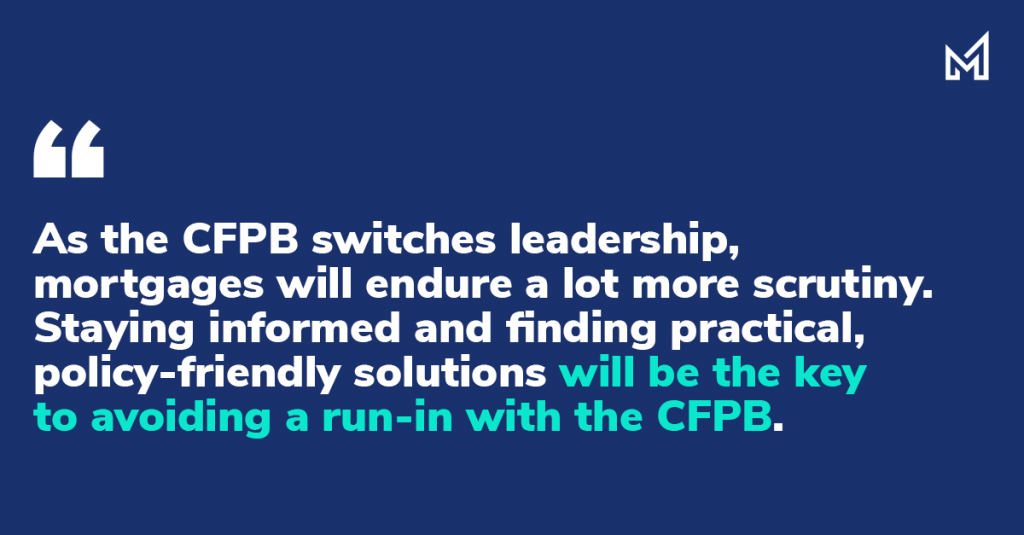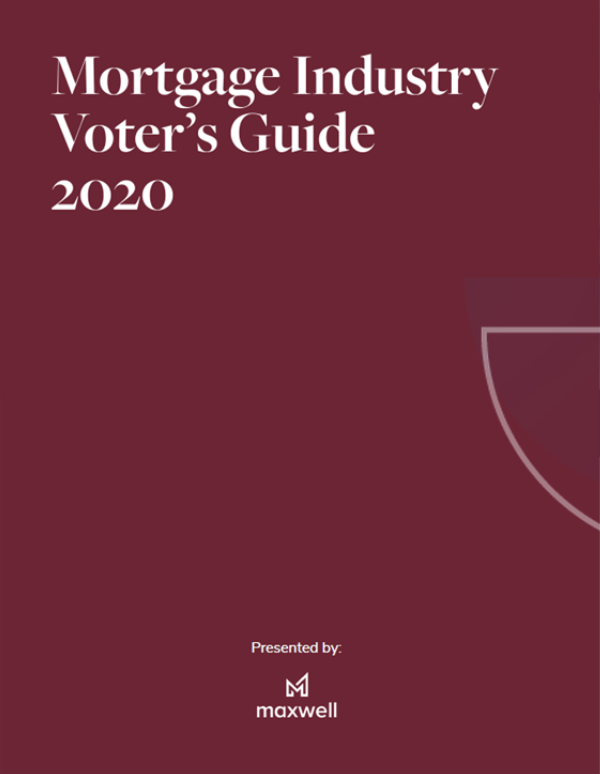How Biden’s CFPB Nominee Will Shake Up the Mortgage Industry

Since its formation in 2010, the Consumer Financial Protection Bureau (CFPB) has been focused on upholding the rights of the consumer within the financial industry. Formed as a response to the Great Recession, the bureau has been responsible for nearly $13 billion worth of settlements against financial institutions of various sizes.
With Biden’s new CFPB director nominee, that number is expected to rise significantly.
When the CFPB was first formed, directors were appointed for a five-year term, and presidents could only fire directors for due cause. Thanks to a Supreme Court ruling in 2020, directors can now be asked to leave “at will.” Thus, former director Kathy Kraninger––whose term technically went through 2023––resigned her position following Biden’s inauguration.
To fill the role of CFPB director, Biden has tapped Rohit Chopra, current commissioner at the Federal Trade Commission (FTC). For some, the nomination comes as no surprise. After all, Chopra was a part of the CFPB for five years, specifically in the student loan oversight realm. That experience combined with his reputation as a tough policy enforcer at the FTC make it likely that his nomination will be confirmed.
For the time being, Dave Uejio has stepped into the role as acting director. Assuming Chopra takes the job permanently, what might that mean for the lending industry?
The role of the CFPB in the lending industry
The CFPB’s function hinges on education and advocacy. As a watchdog organization, the CFPB looks for cases of abuse, negligence, discrimination, and misuses of power. They field and follow up on consumer complaints in the financial industry. They also keep data regarding their enforcements for consumers’ reference.
For the mortgage lending industry, that means scrutiny of almost every practice, including application methods, approval criteria, loan terms, and foreclosure proceedings. Investigations into consumer complaints may require extensive interviews and information subpoenas, which could lead to court cases and ultimately fines, if abuses are uncovered.
But not every lending company falls under the supervision of the CFPB. For the most part, the bureau only regulates companies with $10 billion or more in assets. They also exercise authority over non-bank mortgage originators, payday lenders, and private student lenders of all sizes.
The CFPB under Trump
As with any executive-branch agency, the CFPB has shown differing objectives and results based on who was in charge. Critics say that Trump’s CFPB was a “declawed” or “toothless” watchdog, in comparison to Obama’s CFPB.
With the exception of late 2020, the CFPB took remarkably fewer enforcement initiatives under the Trump administration than it did during the Obama era. On average, the bureau took around five actions per quarter under Trump, whereas it averaged over 13 actions per quarter in 2015 alone. In monetary terms, the agency secured $10.7 billion during the five years it operated under the Obama administration, but only $2.3 billion during the Trump presidency.
That’s not to say that the CFPB was ineffective during Trump’s leadership. In fact, in November 2017, the agency imposed the largest fine in its history against a large national bank found to be abusing rate-lock fees, among other things. In addition to a consumer redress settlement, the CFPB also fined the bank $1 billion.
But in broad strokes, Trump’s CFPB was much friendlier to financial institutions. Acting director (prior to Kraninger) Mick Mulvaney noted a propensity toward negotiations rather than juditiation, calling lawsuits a “last resort.”
Similarly, the CFPB under Trump saw much more rule-busting than rule-making. It’s no surprise that a Republican president would garner a more hands-off approach to regulation. Under Trump, the agency focused on cutting a lot of red tape and even recalibrating the effects of Dodd-Smith, the legislation which established the CFPB in the first place.
Future direction of the CFPB
With Biden’s pick at the helm, the lending industry can likely expect an increase in both oversight and enforcement. By observing both Chopra’s previous track record and Biden’s stated market goals, analysts point to the following possible priorities.
Respond to a COVID-19 economy
COVID-19 has had a crippling effect on most markets. Housing (and therefore mortgage) markets have fared well, for the most part. But that relative stability may not be directly correlating to individual borrowers. Complaints to the CFPB rose 60% in 2020 compared to the previous year, which may indicate distress on the micro level.
Many expect Chopra to prioritize a coordinated COVID-19 economic response. That response could include measures such as stemming foreclosures, monitoring federal aid, and hardlining fair loan terms for faltering small businesses.
Reverse the payday lending rule
In late 2020, the CFPB created a rule that basically allowed payday lenders to give high-interest loans to just about anyone. The lenders didn’t have to verify the borrower’s ability to repay the loan. Chopra will likely reverse or rewrite this rule.
Reopen debt collection rules
Around the same time, Kraninger’s agency also instituted some debt collection regulations. The rules allowed debt collectors to call debtors once per day but did not include stipulations regarding other methods of communication, such as text messages or emails. Democrats would prefer more restrictions on the debt collectors, and Chopra is expected to reexamine the rules.
Prioritize student loan policies
Chopra’s background includes service as a special advisor to the U.S. Department of Education, so he knows the intricacies of student loans firsthand. During his time as CFPB student loan ombudsman, he testified several times on Capitol Hill regarding student loan issues. Many assume that Chopra will work with the Department of Education and Congress to create stricter student loan policies that favor the consumer. Any such policies will likely build on the student loan payment suspension.
Reinstate the Fair Lending office
Acting director Mulvaney reorganized the Office of Fair Lending and Equal Opportunity in 2018 to become more of an internal advocacy unit. Congress balked at this measure, especially since the office had shown such marked success in settling cases for consumers. Chopra will likely reinstate the Fair Lending office and give it renewed authority to pursue discriminatory practices in lending.
Create financial data policies
As financial technology continues to grow, debates about data sharing continue on Capitol Hill. How much control should consumers have over their own financial data? This question and others like it are expected to be a hot topic for Chopra. In the future, the lending industry will likely see increased regulations on the gathering, storing, and security of data.
Regulate overdraft fees
Some on Wall Street expect the CFPB to take a closer look at overdraft fee practices. Overdraft fees account for more than $12 billion in revenue across the U.S. banking industry, but some policymakers consider the practice to be questionable. Chopra will most likely put at least some parameters on overdraft fees.
Impact on the mortgage industry
Assuming Chopra takes the reins of the CFPB, the mortgage industry is going to need to be vigilant in a number of interconnected areas.
Discriminatory standards
As we’ve outlined in our guide to Biden’s proposed policies, access to housing is a top priority for the new administration. The lending industry should be prepared for more well-defined discrimination standards regarding obtaining and maintaining mortgages. Chopra has a reputation as a tireless advocate for financial equity and inclusion for minorities. Assuming he reinstates the Office of Fair Lending and Equal Opportunity, mortgage lenders should expect additional oversight in this area. Companies will want to keep up with any new regulations and ensure compliance in order to avoid investigation.
Data sharing regulation
Lenders will also want to keep an eye on the data sharing debate. Policymakers will likely come to conclusions sooner rather than later, considering the current Democratic alignment between Congressional houses. Data sharing rules will have an impact on lenders and financial tech companies alike. And the CFPB will be the ones watching for compliance with any new data sharing regulations.
Technology compliance
Chopra is known for tackling enforcement issues at the FTC, particularly on big tech companies. In the coming years, lending industry professionals should make it a point to properly vet new technology. Integrating new technology is vital in this increasingly digital, socially-distanced society, but lending companies will need to ensure that their technology aligns with the CFPB’s objectives. Specifically, technology should employ proper security measures and should not employ any kind of discriminatory data or algorithms.
As the CFPB switches leadership, mortgages will endure a lot more scrutiny. Staying informed and finding practical, policy-friendly solutions will be the key to avoiding a run-in with the CFPB. For more on how Maxwell remains on the forefront of both technology innovation and regulatory compliance, take a look at our corporate overview.



